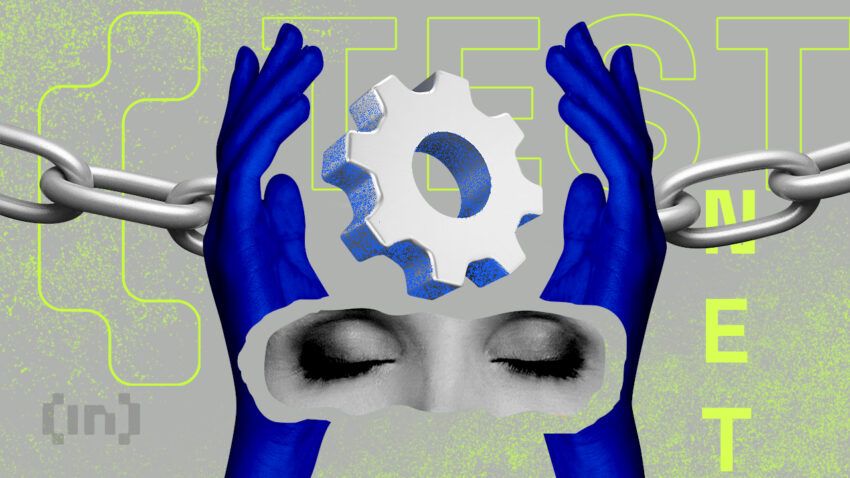As the competition in the crypto segment grows, many teams behind decentralized applications (DApps) are looking to make their development processes more flexible and resource-optimized. As such, more and more devs are replacing self-hosted blockchain nodes with RPC endpoints of node providers.
This article explains the concept behind blockchain nodes and RPC providers and details how to choose the perfect RPC provider for your crypto project. Here’s why switching to an RPC node provider might be a smart bet for a modern crypto project.
BeInCrypto Trading Community in Telegram: read all the hottest news, discuss blockchains, get technical analysis on coins & answers to all your questions from PRO traders & experts!
- What is a blockchain node?
- Why are RPC node providers important for the development of web3?
- What are the main types of nodes?
- What is an RPC node?
- What is an RPC node provider?
- Which RPC node provider should you choose?
- How to choose a blockchain RPC node provider?
- Blockchain RPC node providers are streamlining web3 and DApp development
- Frequently asked questions
- About the author
What is a blockchain node?

A blockchain node is a computer in a decentralized network connected to its peers, responsible for storing and updating blockchain data. Blockchain nodes store information about blocks, transactions, accounts, validation details, and so on.
In some networks, in order to run a blockchain node, its owner should confirm his/her credibility by staking, i.e., ‘locking’ some coins of this network. In this regard, blockchain nodes can be described as device+staker pairs. Cardano, NEAR Protocol, post-Merge Ethereum, and dozens of other blockchains work in this manner. Besides running computers, owners should respectively stake ADA, NEAR, and ETH in specific contracts.
Blockchain node operators (or validators) are incentivized economically and rewarded for their contribution. Typically, the rewards are allocated periodically in the core network’s cryptocurrency. Running blockchain nodes is profitable yet risky: not unlike bitcoin miners, validators can go underwater if crypto prices plummet.
Technically, blockchain nodes are high-performance computers. For instance, to run a Cardano node, blockchain enthusiasts need to employ a minimum of 10GB of RAM, 24GB of hard disk space (this metric grows as the node is working), a high-quality network connection, and so on. Arbitrum nodes require 32 GB RAM, 1 TB SSD storage, and 32-thread CPUs. Maintaining such a device requires expertise in DevOps and software engineering.
Why are RPC node providers important for the development of web3?
Blockchain RPC node providers gained traction in the 2020-2021 bullish rally. They allowed early-stage cryptocurrency projects to accelerate engineering processes and focus on business development, marketing, and user acquisition.
- Blockchain RPC node provider is a service that connects cryptocurrency applications (centralized and 100% on-chain ones) to blockchains.
- With such services, web3 teams no longer need to run blockchain nodes on their own. Instead, they can get connected to blockchains via API interfaces.
- Blockchain RPC node providers create API endpoints: the endpoint can be integrated into dApp or crypto wallet.
- Users of such services send requests to blockchains via APIs: therefore, they can retrieve the information from the blockchain and broadcast it into the network.
- Working with a blockchain RPC node provider is a more resource-efficient and secure option for developers compared to using self-hosted nodes or public APIs.
With the ever-increasing adoption of crypto applications, the role of blockchain RPC node providers will grow as web3 teams look to deliver their products faster. Most providers offer paid and free packages so newcomers can experiment with the instruments for free.
What are the main types of nodes?
To ensure blockchains are decentralized, censorship-resistant, resource-efficient, and protected from 51% attacks, various types of nodes interact with each other. Every type has its own tasks and requirements, advantages, and limitations.
Light nodes
Light nodes (lightweight nodes, light clients) are the basic type of node. These nodes only store and process the headers of the blocks, i.e., sets with information about new transactions. Light nodes work faster than other types but can’t act independently. Light nodes must be connected to full nodes to retrieve and broadcast the information to the blockchains. That’s why light nodes are sometimes referred to as “read-only nodes.”
Full nodes
Full nodes record all transactions, balances, blocks, and accounts on a blockchain within a certain period of time. Most commonly, full nodes store complete information about the last 128 blocks. Full nodes are 100% independent.
Archive nodes
Archive nodes are the most sophisticated form of node. An archive node stores information about all in-blockchain events since the genesis block, i.e., since its first confirmed transactions. To store and operate these huge amounts of data, archive nodes employ powerful hardware. Archive nodes are used by analytical services that need the full history of a blockchain.
What is an RPC node?
Blockchain-based applications — DApps, centralized exchanges, crypto wallets, and so on — interact with blockchain nodes through remote procedure calls (RPC) protocols. RPC is a general-purpose communications protocol. With RPC commands, local computers can interact with remote servers without needing to write low-level code repeatedly.
Namely, DApps interact with blockchain nodes through RPC methods, a class of typical standardized commands. For instance, when an app sends the ‘getBlockHeight’ command (RPC method) to the Solana blockchain, it automatically retrieves the current block height of the node (number of the latest added block).
Technically, applications are sending requests through RPC API endpoints (or RPC endpoints), specific network locations (URLs) where the software can access this or that blockchain. While all RPC endpoints rely on blockchain nodes, some use the definitions of ‘RPC node’ and ‘RPC endpoint’ interchangeably.
Blockchain software can use two types of RPC nodes: public and private nodes. Public RPCs are available for everyone with zero fees, but their throughput is insufficient for mainstream DApps. Users can share them for testing and research purposes. In contrast, private RPC nodes — maintained by RPC node providers — demonstrate impressive tech specifications that are suitable for mainstream DApps.
What is an RPC node provider?
RPC node providers are services that connect crypto applications to blockchain nodes. The provider creates and maintains RPC endpoints to blockchains. RPC node providers create RPC URLs to allow clients to send requests to blockchain nodes. Thus, they eliminate the need for blockchain teams to run the nodes themselves.
RPC node providers run or lease the distributed infrastructure of blockchain nodes so that their clients don’t have to. This allows blockchain developers to save on hardware, DevOps resources, infrastructure costs, etc.
While using RPC node providers, clients pay for the number of requests sent to the blockchain or for a period of using an RPC endpoint with unlimited requests (one week, one month, and so on).
Modern RPC node providers work similarly to e-commerce platforms. Users sign up, purchase endpoints, customize them in a few clicks and integrate RPC endpoints into the codebases of their apps.
Which RPC node provider should you choose?
GetBlock is a leading blockchain RPC node provider. Launched in 2019, the popular provider runs 50+ networks in testnet and mainnet versions, including Bitcoin, Ethereum, Polygon, Solana, BNB Chain, Optimism, and Arbitrum.
GetBlock offers free and paid packages; users can either choose to pay for the number of requests or start working with unlimited RPC endpoints.
The node provider also offers excellent personal assistance services, user support, complementary technical guides, and custom SLAs.
Alchemy and QuickNode are also popular and reliable GetBlock alternatives. Alchemy incorporates a number of potentially useful features, such as a strong NFT API offering. Users can find, display and verify NFTs across blockchains. Meanwhile, QuickNode boasts rapid API times and enables users to leverage real-time blockchain data and advanced alerting.
How to choose a blockchain RPC node provider?
To make his/her experience with an RPC node provider productive, safe, and cost-efficient, users should compare all available alternatives by a number of indicators. Here are a few.
Functionality
A good RPC node provider should be multi-purpose. It should support the maximum number of mainstream blockchains, both main nets and test nets and various interfaces (JSON RPC, WebSockets, gRPC). Networks from different segments should also be supported, including the Ethereum Virtual Machine ecosystem, L2 networks, CosmWasm ecosystem, and major non-programmatic blockchains. This toolkit should be flexible and offer customization opportunities in a no-code manner.
Price
To make the development process cost-efficient, users should know the price of every request they send to the network.
RPC node providers should clearly explain its rate limit (number of requests users can send per second), net requests amount (number of requests available for a limited package), pricing, and promo campaigns. Sometimes paying more for a high-performance and fast endpoint with an unlimited premium tariff is better.
Speed and uptime
To be sure about the sustainability of its DApp operations, the team needs to compare the connection speed and uptime of various providers. The uptime should be fixed in a service level agreement; good RPC node providers guarantee 98-99% uptime in all service packages.
Customer support
A proper RPC node provider should have 24/7 channels of customer support. Discord servers, Telegram chats, email support, and feedback forms. The user should be able to interact with the provider through various independent channels.
Besides comparing the offers of blockchain RPC providers, potential clients should analyze the reviews and feedback available on public websites and trackers.
Blockchain RPC node providers are streamlining web3 and DApp development
Instead of running blockchain nodes on their own, web3 developers can use RPC endpoints by node providers. Using the resources of blockchain node providers makes crypto development more streamlined and resource-efficient. Ultimately, teams can save money and effort by working with private RPC nodes instead of using self-hosted nodes and public RPC endpoints.
Frequently asked questions
What is a blockchain node?
How to run a blockchain node?
How to use an RPC node?
How much does it cost to use an RPC node?
About the author

Deen Newman is a Project manager with GetBlock, he has more than five years of experience in content writing on blockchain and IT topics.
Disclaimer
In line with the Trust Project guidelines, the educational content on this website is offered in good faith and for general information purposes only. BeInCrypto prioritizes providing high-quality information, taking the time to research and create informative content for readers. While partners may reward the company with commissions for placements in articles, these commissions do not influence the unbiased, honest, and helpful content creation process. Any action taken by the reader based on this information is strictly at their own risk. Please note that our Terms and Conditions, Privacy Policy, and Disclaimers have been updated.




